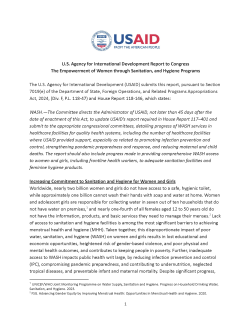The U.S. Agency for International Development (USAID) submits this report, pursuant to Section 7019(e) of the Department of State, Foreign Operations, and Related Programs Appropriations Act, 2024, (Div. F, P.L. 118-47) and House Report 118-146, which states:
WASH.—The Committee directs the Administrator of USAID, not later than 45 days after the date of enactment of this Act, to update USAID’s report required in House Report 117–401 and submit to the appropriate congressional committees, detailing progress of WASH services in healthcare facilities for quality health systems, including the number of healthcare facilities where USAID provided support, especially as related to promoting infection prevention and control, strengthening pandemic preparedness and response, and reducing maternal and child deaths. The report should also include progress made in providing comprehensive WASH access to women and girls, including frontline health workers, to adequate sanitation facilities and feminine hygiene products.
Increasing Commitment to Sanitation and Hygiene for Women and Girls
Worldwide, nearly two billion women and girls do not have access to a safe, hygienic toilet, while approximately one billion cannot wash their hands with soap and water at home. Women and adolescent girls are responsible for collecting water in seven out of ten households that do not have water on premises,1 and nearly one-fourth of all females aged 12 to 50 years old do not have the information, products, and basic services they need to manage their menses.2 Lack of access to sanitation and hygiene facilities is among the most significant barriers to achieving menstrual health and hygiene (MHH). Taken together, this disproportionate impact of poor water, sanitation, and hygiene (WASH) on women and girls results in lost educational and economic opportunities, heightened risk of gender-based violence, and poor physical and mental health outcomes, and contributes to keeping people in poverty. Further, inadequate access to WASH impacts public health writ large, by reducing infection prevention and control (IPC), compromising pandemic preparedness, and contributing to undernutrition, neglected tropical diseases, and preventable infant and maternal mortality. Despite significant progress, achieving Sustainable Development Goal targets for sanitation access will require a fivefold increase over the current rate of progress.3 In addition to lack of WASH, poor access to accurate information and harmful gender norms persist in preventing women, especially those who are menstruating, from fully engaging in family, community, educational, economic, and social life.
In Fiscal Year (FY) 2022, the most recent year for which quantitative standard indicator data are available due to annual reporting cycles, USAID helped 2.7 million women and girls gain access to safe drinking water, and more than 2 million women and girls gain access to improved sanitation. This includes increased investments in MHH, social and behavior change, and research in the water and sanitation sectors that benefit women and girls. Further, in FY 2022, USAID mobilized more than $133 million in additional funding for WASH programs from public and private sources, increasing the durability of USAID’s investments in women and girls. USAID’s programmatic highlights from (FY) 2023 follow (results data will be available in 2024). In FY 2023, USAID support also increased WASH access in healthcare facilities (HCFs) across 21 countries, providing a total of 85 HCFs with basic sanitation access and 108 with basic drinking water access.4
1 UNICEF/WHO Joint Monitoring Programme on Water Supply, Sanitation and Hygiene. Progress on Household Drinking Water, Sanitation, and Hygiene. 2023.
2 FSG. Advancing Gender Equity by Improving Menstrual Health: Opportunities in Menstrual Health and Hygiene. 2020.
3 UNICEF/WHO 2023.
4 Starting in FY 2023, OUs report on a new indicator capturing the number of HCFs getting access to basic sanitation. Additionally, reporting will be required for indicators capturing both water and sanitation in HCFs.

